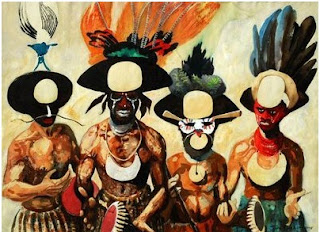THE Engan dance, the Mali, is one of the traditional rituals that is gradually dying away due to non-recognition of its significance in the modern and traditional contexts.Previously, the Mali was hosted for reasons that cannot match today’s purposes. Furthermore, the importance of the Mali from both modern and traditional perspective is not understood by majority of the Engans due to the current trend towards modernity and the weakening of culture, tradition and custom.
Currently, the Mali is one of the major tourist attractions in Enga and has gained popularity at the annual Enga Cultural Show with its Sili Muli, an all women Mali dance group.
However, there are shifting cultural factors that have influenced Engans to overlook the significance of the Mali and interest and eagerness to participate and learn has been minimal among youth with the Mali losing its purpose and authenticity.
As a unique tradition, the Mali needs to be maintained and preserved through promotion and creating awareness and interest to rejuvenate and protect it from losing its values.
Enga Province has minimal economic activity and the support of the provincial government is required in funding awareness, cultural promotion and preservation through tourism activities.
There are possibilities to encourage the younger generation to learn how to preserve and sustain the Mali and to understand and value the cultural and traditional aspects of Engan life. Thus we may help maintain and sustain the Mali from dying away silently as a result of modern influences.
It is interesting to see, through the influence of the one language spoken throughout the province, that the customs practiced in traditional societies are same throughout Enga. However, religion, education, employment and rural to urban migration have much influenced the Mali.
Although there are some Mali dance performances with contemporary costumes, the authenticity of and pride in the Mali dance seems to have lost its value. The same detrimental factors can be seen in the other cultures and traditions of PNG amid the 800 plus language groups - they are dying away in a similar manner.
Akii Tumu’s book, ‘View of The Enga Culture’, states that, in the past, most Malisingsings took place to gather people to discuss upcoming feasts or exchanges, but today they are held primarily to raise money for public facilities, to celebrate holidays or other important events. This commercialisation with contemporary costumes imitates the authentic Mali dance but is of no substance in terms of its cultural values.
Today, most PNG societies seem to have an oral tradition as an historical source but the reality of traditional ways of life are dying away as we shift our focus to modernity and development. The concept of imparting skills and knowledge, learning and imitating traditions and customs from great tribal or clan ancestors seems not to exist these days.
The children live far away from their villages, parents and families and are unable to participate in village cultural activities – they do not learn and understand them. The loss of the vernacular language is also an important barrier as most people now communicate in English, Pidgin and Motu.
The opportunities to teach traditional customs to the younger generation are narrow, leaving a gap which needs to be helped if it is to be revived and sustained.
In Enga, the way of doing things which were passed down the generations are at risk in these days when everyone’s focus is on modernity. Thus the Enga traditional dance, which followed the same pattern of sharing, teaching and imparting knowledge to preserve the values, genealogies and narratives which were the basis of its existence, is losing its influence and, without great care, may be lost forever.
The Papua New Guinea Tourism Promotion Authority (PNGTPA) identifies cultural tourism as a significant source for national tourism growth due to the authentic cultural experiences that are PNG’s biggest selling tourism product.
The UN World Tourism Organisation has stated that cultural tourism accounts for 37% of global tourism and forecasts a growth rate of 15% per year. This is particularly true for PNG where travel statistics show increased arrivals in the months of July to September as a result of cultural festivals staged in various parts of the country, especially the Mask Festival, the Mt Hagen Show, the Hiri Moale and the Goroka Show.
Cultural festivals, village tours and stays that are worked into travel itineraries always prove attractive for tourists and are a common feature in many successful tour operators’ packages.
PNGTPA’s major challenge in cultural tourism has been in aligning the modern or Western concept of tourism as a business with the Melanesian cultural practices of shared resources and land ownership.
Hence, PNGTPA works closely with tour operators and tourism associations to help reinforce, support and preserve the local communities and their culture. Partnerships in tourism are vital for PNG especially in the preservation of culture and natural resources.
PNGTPA’s most successful partnership projects have been the Surf Management Plan headed by the Surfers Association of PNG. This project aims to ensure that the village communities where surfing tourism takes place receive shared benefits through fees and that rules are implemented to limit the number of surfers so protecti.ng the environment.
As a passionate observer of cultures and traditions of our country, I am always interested to learn and discover more about the various cultures and traditions of PNG. I am eager to learn in detail about our cultures in their full contexts and whether they are still practised. Sadly, the traditions have changed and contemporary culture has dominated what used to be our authentic way of life.
I have come to known that many young people cannot speak any native languages from either of their parents’ tribes and clans. Language is part of culture and tradition and to lose language is to lose culture and tradition.
This is the source link: Tourism and Tradition - Can they co-exist in modern PNG ?


